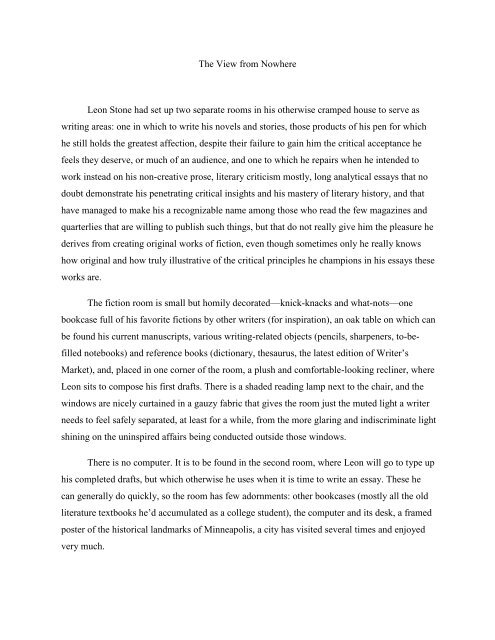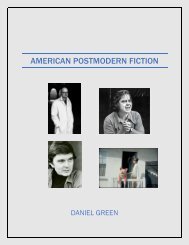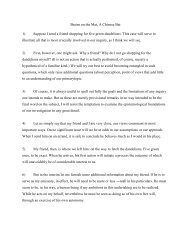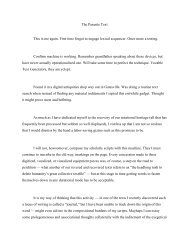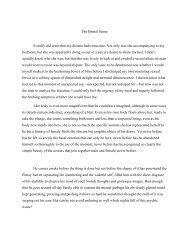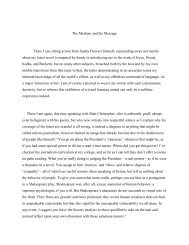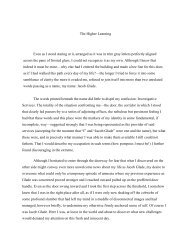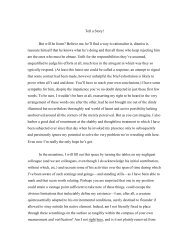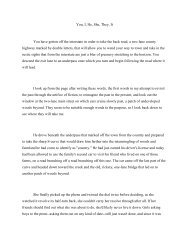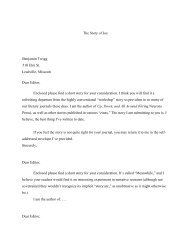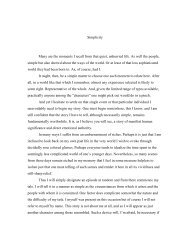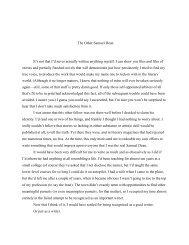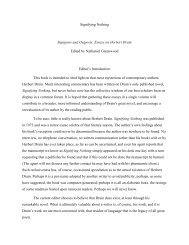The View from Nowhere
Create successful ePaper yourself
Turn your PDF publications into a flip-book with our unique Google optimized e-Paper software.
<strong>The</strong> <strong>View</strong> <strong>from</strong> <strong>Nowhere</strong><br />
Leon Stone had set up two separate rooms in his otherwise cramped house to serve as<br />
writing areas: one in which to write his novels and stories, those products of his pen for which<br />
he still holds the greatest affection, despite their failure to gain him the critical acceptance he<br />
feels they deserve, or much of an audience, and one to which he repairs when he intended to<br />
work instead on his non-creative prose, literary criticism mostly, long analytical essays that no<br />
doubt demonstrate his penetrating critical insights and his mastery of literary history, and that<br />
have managed to make his a recognizable name among those who read the few magazines and<br />
quarterlies that are willing to publish such things, but that do not really give him the pleasure he<br />
derives <strong>from</strong> creating original works of fiction, even though sometimes only he really knows<br />
how original and how truly illustrative of the critical principles he champions in his essays these<br />
works are.<br />
<strong>The</strong> fiction room is small but homily decorated—knick-knacks and what-nots—one<br />
bookcase full of his favorite fictions by other writers (for inspiration), an oak table on which can<br />
be found his current manuscripts, various writing-related objects (pencils, sharpeners, to-befilled<br />
notebooks) and reference books (dictionary, thesaurus, the latest edition of Writer’s<br />
Market), and, placed in one corner of the room, a plush and comfortable-looking recliner, where<br />
Leon sits to compose his first drafts. <strong>The</strong>re is a shaded reading lamp next to the chair, and the<br />
windows are nicely curtained in a gauzy fabric that gives the room just the muted light a writer<br />
needs to feel safely separated, at least for a while, <strong>from</strong> the more glaring and indiscriminate light<br />
shining on the uninspired affairs being conducted outside those windows.<br />
<strong>The</strong>re is no computer. It is to be found in the second room, where Leon will go to type up<br />
his completed drafts, but which otherwise he uses when it is time to write an essay. <strong>The</strong>se he<br />
can generally do quickly, so the room has few adornments: other bookcases (mostly all the old<br />
literature textbooks he’d accumulated as a college student), the computer and its desk, a framed<br />
poster of the historical landmarks of Minneapolis, a city has visited several times and enjoyed<br />
very much.
It was to this room, in fact, that Leon had gone on the day that concerns us. Leon was sitting in<br />
the inexpensive but not uncomfortable office chair preparing to commence the day’s work (a<br />
critical essay in which he was busily demolishing the reputation of a current novelist whose<br />
laughably artificial prose was so distressingly overvalued) when he suddenly plunged into an<br />
existential crisis unlike any he had ever before experienced.<br />
<strong>The</strong> fiction of Julian Meadows is notorious for the way in which it often begins by<br />
misdirecting the reader’s attention. A typical Meadows story will place us in a seemingly<br />
ordinary setting, described in the most matter-of-fact way, only to suddenly introduce what will<br />
be the story’s motivating conflict, seemingly out of nowhere. If the reader is first led to believe it<br />
is a story exploring the surface realities of its protagonist’s situation, she is abruptly forced to<br />
confront a wholly new story in which the depths of suffering human consciousness will be<br />
brought to the reader’s attention by a writer of great psychological penetration.<br />
And Leon had indeed endured many such crises over the span of time he had spent<br />
perfecting the scribbler’s art, episodes of self-doubt and intimations of futility so intense and<br />
burdensome it was all he could do not to lie down on the floor and never get up, prolonged<br />
periods of dark despair in which existence itself seemed so senseless, so frankly bizarre and<br />
absurd, that he mostly wanted no part of it, although he never really made any effort to be done<br />
with it, beyond finding a piece of rope one day and wrapping it around his neck just to convince<br />
himself he was really serious in his disaffection, that he would really do it if the feelings didn’t<br />
let up, that there was a point beyond which his ability to accept misery and degradation would<br />
not extend, where he would not allow it to persist, although that point never quite seemed to<br />
approach, or if it did, it kept being moved off a little farther along the line of toleration and<br />
acquiescence, and eventually the worst of it would be over, although never would he be entirely<br />
free of this unwelcome knowledge that lurking behind all our restless activity there is nothing, no<br />
plan, no point, no reason, really, to pursue any such activity except for the sake of activity itself,<br />
to avoid simply coming to rest and confronting the void that endlessly expands itself all around<br />
us but that our busyness allows us to ignore, and, perhaps because of this very knowledge, each<br />
subsequent occurrence of these psychic breakdowns was just that much worse, the slough of
despond deeper, the conviction that all endeavor, all struggle, even the struggle to write, was<br />
utterly useless even greater, until now this latest seizure of immobility threatened to leave him<br />
permanently incapacitated, if only because he can now see that every time he manages to renew<br />
his sense of purpose and rededicate himself to getting on with the work that ought to be giving<br />
him satisfaction, or else why would he do it, he only wound up in an even deeper psychological<br />
pit, this time so deep he’s pretty sure he can’t get out, the feeling of being hemmed in, confined,<br />
cut off <strong>from</strong> reassuring light and revivifying air, so intense he thinks his whole body is simply<br />
going to cave in, his very being squeezed out of existence, and if this is the price to pay for<br />
continuing to function, at least part of the time, at something like a normal level of competence,<br />
then he would prefer just to stop, cease trying, lapse into a voluntary catatonic state, declare it all<br />
a worthless fraud, an opportunity only for torment and torture, undeserving of any further effort<br />
to make it make sense,<br />
Meadows has often indicated—although surprisingly few commentators have taken note<br />
of the fact—that his most immediate influences are the great modern interrogators of human<br />
consciousness: Henry James, Virginia Woolf, James Joyce. <strong>The</strong>ir unstated doctrine that the<br />
proper work of the novelist is to limn the processes of the mind in all its impulsive flow, to<br />
connect the reader with another human personality through the writer’s authentic re-creation of<br />
the singular mental life that comprises such a personality, is Julian Meadows’s own literary<br />
lodestone. In all of his work its pull can be recognized in his unwillingness to sacrifice this<br />
psychological verism to the artificial demands of plot or theme or what some critics want to call<br />
fine writing.<br />
While it would probably not be surprising for readers of Meadows’s fiction to learn that<br />
he sees himself as the inheritor of a tradition of interiorized fiction a la James and Woolf, they<br />
might be interested to know further that Julian Meadows did not truly understand the nature of<br />
his literary task until he came upon the writing of the European critic Petr Yankoff. In particular,<br />
he has never forgotten this passage, <strong>from</strong> Yankoff’s book Projecting the Self: “To find a<br />
straightforward and unmediated perspective on the performing subject, to bear witness to his<br />
self-revelations in the act of enunciation itself, is crucial to the reading subject’s capacity to<br />
situate himself satisfactorily in relation to the text itself, its meanings, judgments, its mutually
einforcing obligations. All writers are always in the process of projecting a self, a self that<br />
speaks to the receiving self simultaneously embroiled in the ongoing performance of writing-aswriter.”<br />
Since, following on Yankoff’s keen insight, writing is always about the writer, an attempt<br />
on the writer’s part to (literally) express himself and on the reader’s to apprehend and appreciate<br />
the irreducibly human outlook thus expressed, exemplifying as it does the very possibility of<br />
manifesting such an outlook, what better way to get at the very essence of literary art than to<br />
write directly about writers struggling to write?<br />
I knew that my problem would cease once I had written the first convincing sentence, the<br />
sentence leading me someplace I’d never been before. Luckily, on this day that sentence came<br />
rather quickly, as if, taking pity on me in my almost farcical incapacity, another writer, at that<br />
moment hovering omnipresently somewhere over my shoulder, whispered the words in my ear,<br />
commanded my hand to take the pencil firmly in its grasp and press it to the page. <strong>The</strong> act of<br />
writing itself—more precisely, the act of finding the words that give your sentences a shape you<br />
could not have pre-designed, a meaning you could not have anticipated fully, that prompt you to<br />
say what you never knew to say—remains the only reliable remedy for these attacks of<br />
despondency.<br />
Although, as my wife would always remind me, it is this very writing that causes me<br />
such distress to begin with. Or at least it is the reception it has received that is the problem,<br />
which is to say the lack of reception, more precisely. <strong>The</strong> utter silence it has provoked would be<br />
more precise still.<br />
Well, at least he finally admitted it. All that time he would keep saying that his work was<br />
appreciated by a few, but that this knowing few, though indeed few, were still knowing, and this<br />
is the audience a writer true to his art doesn’t just settle for but finally wants to reach. And<br />
sometimes the knowing few spread the word far enough that a writer might at least make a living<br />
at it.
<strong>The</strong> worst thing was that I listened to this. For a while, anyway. <strong>The</strong> day he announced<br />
he’d quit his job in order to devote himself full-time to nothing but writing was the day I could<br />
no longer stay and watch him consign both our lives to final failure. It was not so much that I<br />
didn’t believe he was a gifted writer—even, in some ways, a genius. It was, rather, his singlemindedness,<br />
his unwillingness to compromise, his devotion to literature as if it were a religious<br />
calling.<br />
Readers of Julian Meadows’s work are well aware of his systematic disregard of what is<br />
conventionally known as “point of view.” Not only does he switch freely <strong>from</strong> the omniscient to<br />
the subjective form of narration, but he also as freely changes the perspective <strong>from</strong> which his<br />
stories are told <strong>from</strong> character to character. Purists find this technique disconcerting, but<br />
ultimately it, too, is a strategy designed to help achieve this writer’s larger goal of digging<br />
beneath the external details of ordinary existence, of avoiding the reduction of fiction to the<br />
recording of “information” to be conveyed to readers turning to fiction for the most superficial of<br />
reasons: to see the familiar world reflected back to them, to experience that ersatz world in all of<br />
its illusory fullness at the expense of coming to know knowing itself as recreated by the literary<br />
artist.<br />
In effect, Meadows depicts human awareness as interdependent, the individual mind<br />
capable both of attaining a detached, objective perspective (the “view <strong>from</strong> nowhere”) and of<br />
linking up with other individual minds to produce a collective core of consciousness, a connected<br />
cluster of coordinated cognition the conveyance of which is the requisite responsibility of the<br />
writer. Meadows has dedicated himself to the task of carrying out this imperative and of avoiding<br />
the superficial satisfactions of the more obvious displays of shameless gimmickry other writers<br />
settle for.<br />
As he prepared to enter the seminary, Leon had few qualms about the choice he had<br />
made. Although, perhaps it wasn’t entirely proper—not altogether a happy omen—that just as he<br />
had committed himself to studying for the clergy he had also concluded he no longer believed in<br />
God.
He had always has his doubts, in truth his crisis of faith had come about gradually, his<br />
final realization really only the ultimate point in a line that led <strong>from</strong> that first Sunday when the<br />
prospect of going to church seemed laborious indeed in contrast to the possibility of remaining in<br />
bed and sleeping a while longer to the evening just last week when Leon turned the last page of<br />
Outside of Life, the book that has finally and irreversibly convinced him that the construct of the<br />
omnipresent and efficacious God guiding things <strong>from</strong> “outside of life” cannot be maintained by<br />
clear-thinking people. For someone like Leon, a man who has always felt the need to believe in<br />
something other than flux and instability, something to which he could voluntarily pledge<br />
himself in both calling and conviction, this last experience threatened literally to be the end of<br />
the line.<br />
But to swerve <strong>from</strong> his original decision to dedicate his talents to the elucidation of God’s<br />
purpose in the world He had created would serve only to expose his own weakness. He could<br />
still use his office to help people deal with their own doubts and disappointments, couldn’t he?<br />
Even if he himself could not settle for make-believe, a willing suspension of credulity in order to<br />
live in self-invoked illusion, he could persuade others that such illusion was preferable to an<br />
existence of unceasing despondency that terminated at last in hopelessness. This was not the<br />
work he had envisioned when he first set his sights on the ministry, but why should he not regard<br />
it as useful work, even so? He would trust in time to validate this conclusion.<br />
Another move Julian Meadows likes to make is to fracture the chronology of his fiction,<br />
forcing the reader to constantly readjust herself to alterations of time and setting. But these<br />
manipulations of sequence, however disruptive of the reader’s expectations of an exclusively<br />
linear development of plot in works of fiction, finally only expand our conception of what “plot”<br />
can be, help bring into fiction a more capacious ability to encompass “life” in all of its vanishing<br />
points of time and cumulative transfers of place. Along with the fluidity in point of view we<br />
encounter in Meadows’s work, this fluidity of event (the former frequently in tandem with the<br />
latter) signals Julian Meadows’s unswerving commitment to perfecting the novel as not merely a<br />
transitory literary form but as indeed a veritable Book of Life.<br />
During the time Leon was grappling most fiercely with his unassuageable feelings of<br />
self-contempt, he began to take daily walks through the thick and verdant woods behind the
seminary, itself situated on a rolling, lushly green piece of ground on the outskirts of town, a<br />
modest Midwestern city that brandished its middle American values like a Roman legionnaire<br />
his shield, defending against the depredations of those marauding outsiders threatening to<br />
overthrow them.<br />
But Leon could not be protected <strong>from</strong> his own ungovernable impulses, seeking <strong>from</strong><br />
within to overrun his moral defenses and lead him into sin and degradation. Thus through an act<br />
of will he took these daily excursions into nature’s bower, the fertile forest, the place where, if he<br />
was to find it at all he would find the evidence of God’s presence, if not encounter Him directly<br />
and beseech Him to relieve him of his temptations. At the very least he was able to arrest his<br />
frantically swirling thoughts and repose instead in the comforting balm he found in this calming<br />
copse, this glorious grove.<br />
He would take the worn-down, serpentine path provided by those previous sojourners in<br />
this peaceful park, perhaps themselves perambulating its parcels for the same purpose as Leon<br />
now pursued, and wend his way past the oaks, the maples, the firs, the sycamores, sometimes<br />
veering off the path and into the shadows shed by these stately, sinuous towers of flourishing<br />
foliage and revel further in the profusion of plant life waiting within their protective penumbrae.<br />
<strong>The</strong>se flowers and ferns, these saplings and shrubs, seem to soothe his troubled spirit like<br />
a magic wand waved over him by a beneficent forest sprite, like a soporific elixir administered<br />
through some rustic sorcery incarnate in this beguiling tract of woodland. And occasionally small<br />
animals could be espied, creatures whose behavior he would study with great wonder, like a<br />
spaceman suddenly plunged into an alien world and confronted with life forms so unfamiliar in<br />
their apparent purpose he can only stare open-mouthed in his perplexity, watching them as they,<br />
seemingly heedless of his interest in them, go on about their business like self-directed beings<br />
who instinctively understand their place in the universe and do not waste even one moment of<br />
their precious time in life brooding about the ultimate point of it all, dwelling on the fact that, as<br />
far as anyone could tell, all activity undertaken by the living was poor recompense for the utter<br />
extinction one had to endure when dead.
When all is said and done, however, Julian Meadows should be judged primarily as a<br />
stylist of great descriptive, almost poetic, power and amplitude. All of the other techniques<br />
surveyed here, in fact, can be said to be designed to draw the reader’s attention to Meadows’s<br />
own writing as writing, to make the reader contemplate the prose in prose fiction, ultimately to<br />
focus the reader’s interest as a reader on the properties of his own precise, but intensely<br />
evocative style. This style is especially notable for its immersion in nature imagery, delivered in<br />
pungently worded, perfectly cadenced sentences that evoke the natural world both limpidly and<br />
with heightened figurative force.<br />
True devotees of literary style cannot fail to appreciate in particular Meadows’s masterful<br />
command of metaphor and simile, his inexhaustible ability to make us see the world anew<br />
through original and intricately conceived figures almost metaphysical in their signifying scope,<br />
frequently tied together sequentially to create an ongoing meld of meaning that at times perhaps<br />
threatens to overwhelm the passive reader unprepared for a kind of fiction that operates so purely<br />
to refine language itself into a burnished gem of reflected life.<br />
Leon put down his pencil, pleased at the progress he had made on this day. <strong>The</strong> overrated<br />
current novelist was getting his comeuppance, indeed. Such a mishmash of incoherent rambling<br />
and backtracking! It’s hard to believe such writing wasn’t laughed into the garbage bin, much<br />
less published and sold in real bookstores. Leon is constantly taken aback by the gullibility of<br />
most readers these days. Rarely does he begin reading a newly published novel that he is<br />
subsequently able to finish, so transparent are the desperate devices its author is likely to resort<br />
to in order to trick the unwary reader into simply turning the page.<br />
Soon enough he will again start going to the other room, the fiction room, and begin<br />
working again on his own latest fiction, the writing of which he has temporarily interrupted to<br />
compose the current critical essay, a short story, as it happens, a story he likes to think<br />
provocatively combines the intelligence and intellectual rigor of his criticism with the probing<br />
lyricism he believes his fiction has always exhibited. Since few people have bothered to take<br />
note of this quality in his fiction—or little else about it, for that matter—perhaps the new<br />
approach will draw the attention of those who think of him only as a reviewer of other people’s<br />
books. If they think of him at all.
Julian Meadows, shortly after bringing his protagonist to his moment of self-recognition,<br />
realized himself that he could no longer continue to use this persona he had created to give<br />
expression to his own frustration at being underappreciated. Julian Meadows is a well-known<br />
and amply rewarded writer of fiction who is otherwise as content with his lot as man could be—<br />
he’s never had a depressive moment in his life—and does not consider his work particularly<br />
complex and certainly has never considered it something like a substitute for the religion he long<br />
ago abandoned but still fells a need to approximate.<br />
Lately Julian Meadows has taken to writing essays spelling out his ideas about literature,<br />
about the role of prose fiction (as an entertainment, but entertainment that lifted people’s spirits,<br />
did not pander to their baser instincts for crude sensationalism) and of the writer in American<br />
society (not just as an entertainer, but as a teller of tales that allow readers a respite <strong>from</strong> the<br />
random occurrences of ordinary life through his mastery of the organizing powers of narrative).<br />
But not many had seemed to take notice of them, and those few who had mostly dismissed them<br />
as the jejune jottings—a phrase actually used by a self-styled “critic” in one of the (luckily little<br />
read) literary quarterlies—of a middlebrow novelist trying to burnish his otherwise dubious<br />
intellectual credentials.<br />
Thus Leon Stone, his methodical working habits, his experience of writing as a kind of<br />
agony, his flights of experimental fancy. But it can’t go on.<br />
Although it will go on. As it happens, “Leon Stone” has taken on a life of his own,<br />
unknown even to Julian Meadows, who, one must finally acknowledge, did indeed bring this<br />
character into existence in the first place, if only in the most rudimentary and not especially<br />
skillful fashion. Moreover, we are forced to admit further that the Leon Stone in question has in<br />
turn created a character named “Julian Meadows,” a popular novelist who wishes his theories<br />
about the writing of fiction not just to be taken seriously, but to be accepted as the definitive<br />
statement about the art and craft of fiction. During those moments when Julian Meadows’s<br />
attention wanders, when he is thinking about something other than the need to keep Leon Stone<br />
on his forced march across the page and on to who knows where—perhaps about how at that<br />
very moment some aspiring novelist toiling away as a book reviewer or journalist or “scholar”<br />
might be looking away <strong>from</strong> his own writing desk or computer screen to imagine the mere
novelist (most of whom had gotten published in the first place because they knew which backs to<br />
scratch) who could marshal the resources of English prose in the breathtaking way he was in the<br />
process of demonstrating in his own work-in-process, even if it was a piece of critical analysis or<br />
literary journalism and not “fiction”—Leon Stone has snuck in between the lines—or perhaps<br />
behind them, furtively enough that Meadows wouldn’t notice, or would think it just the faint<br />
afterimage of his own projected obsessions—to provide a mocking counterpoint to Julian<br />
Meadows’s uncertain flourishes of the pen. You might believe that such an occurrence is literally<br />
impossible, that it is no more than a fancy, a conceit concocted to express some larger idea the<br />
writer doesn’t want to say flat out, but I can testify by my own personal experience that it can<br />
happen. I myself have invoked a fictional character into figurative existence only to find him<br />
recalcitrant and uncooperative, taunting me to reassert control and get on with the task at hand.<br />
Once such a creature disappeared altogether, only to turn up later as the author of a magazine<br />
article in which he asserted his own right to “expose” my “incompetence” as a writer of<br />
“fiction,” his very “appearance” in this respected publication being the very best “evidence”<br />
available that I had no talent for the “imaginary” whatsoever. Suffice it to say it left me feeling<br />
like I was myself a fictional creation, in a story of the kind for which I otherwise have the least<br />
possible regard. In fact, while I am conscious of sitting here at this table , pressing these words<br />
into a notebook as I were indeed their “author,” the agent by which they cohere into something<br />
resembling sense and the authority of last resort, I am unable to recall with certainty precisely<br />
what task I had set for myself before taking a seat here: Was I in the process of explicating the<br />
subject at hand (the subject shared by both Leon Stone and Julian Meadows, that is, the need to<br />
assert one’s prerogatives, one’s justly-acquired deserts), or am I myself the subject being<br />
explicated, yet another character wandering around in the limbo between the wish and its<br />
fulfillment?


